Over-Functioning: One Huge Parenting Mistake That Delays Kids’ Development
“Mom! Get me food now!”
I heard my son yell this as he stood next to the fridge. Mind you, he is twelve years old and fully capable of making himself a lunch. My immediate reaction was to push him aside and do what he demanded. Then, I stopped and realized giving in to his (very direct) request wasn’t helping him. I later found out, it wasn’t helping me either.
Instead of continuing to prepare his food, I stopped and asked him if he needed my help with anything as he got himself lunch. He said, “No,” and then continued to make and eat lunch.
Without realizing it, I fell into a pattern of doing everything for my kids. It didn’t stop with tasks.
This particular son has additional needs which makes it very easy for me to drain all of my emotional energy as I attempt to emotionally regulate. At least, that’s what I convinced myself I was doing. Instead, I was trying to make him happy at all costs.
For years, I have been reading about over-functioning and talking about it in blog posts like this one. It wasn’t until I was completely depleted and found myself on a therapist’s couch because my body was shaking and I couldn’t stop crying. Then I heard her say, “You are over-functioning, Adriane. Something has to change.”
I was making a huge parenting mistake without even realizing it.
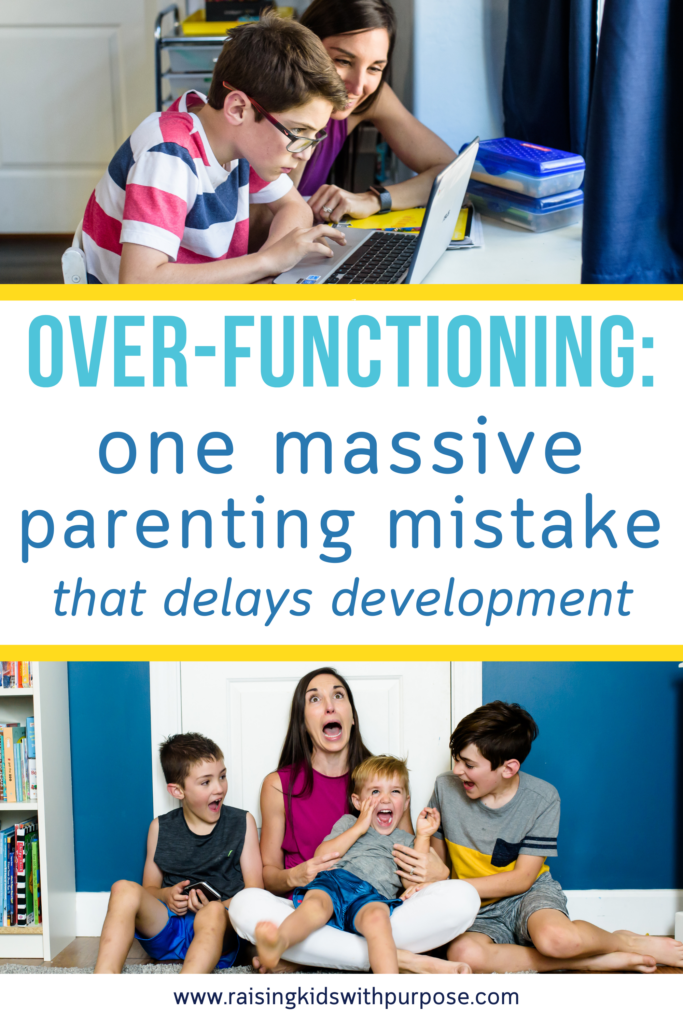
This post contains affiliate links, see disclosure policy for details.
Table of Contents
Understanding Over-functioning in Parenting
It didn’t even occur to me that I was over-functioning because my kids are incredibly independent. They pack their own lunches, pack for vacations, get themselves up and ready in the mornings, and have a lot of responsibilities. However, there were many ways I was over-functioning without realizing it and doing things for my kids for the sole purpose of avoiding conflict.
Dr. Erica Reischer, author of “What Great Parents Do: 75 Simple Strategies for Raising Kids Who Thrive” explains that over-functioning is when parents do something for a child who is developmentally capable of doing the task for themselves.

The Many Faces of Over-functioning
Over-functioning manifests in multiple ways, often so subtly that parents don’t recognize these behaviors as problematic or as a huge parenting mistake. Hello, my name is Adriane and I’m an over-functioner who had no idea I was doing it!
Understanding these different forms of over-functioning can help us identify and address our own tendencies.
Physical Over-functioning
When we physically over-function, we basically become our children’s personal assistants.
Think about one part of the day and everything in that timeframe that a parent can do for his or her child. As an example, let’s use the before-school routine. Over-functioning may look like a parent:
- Waking the kids up instead of encouraging them to use an alarm clock
- Making their beds for them
- Putting their clothes on even if they are COMPLETELY capable and able
- Making their breakfast
- Packing their lunches or prepping their lunchbox from what they packed the night before
- Reminding the child over and over again what time he needs to get in the car.
All the while, the child watches TV or does a preferred activity instead of getting him or herself ready to leave the house.
This has been me! I told myself I was being helpful especially because my son is NOT a morning person. In reality, I was preventing him from developing crucial life skills and time management skills.
Read Next: 4 Easy Steps for Teaching Life Skills to Kids
Physical over-functioning also extends beyond the home.
You might spot a parent at the playground, trailing behind their child with snacks and water, ready to swoop in at the first sign of hunger or thirst. Meanwhile, their child never learns to recognize their own needs or plan ahead.
Physical over-functioning can become so ingrained that we don’t even question why we’re still cutting our eight-year-old’s meat or carrying our sixth-grader’s backpack to the car.
I want to mention it’s OKAY to do some things for your kids to create a secure attachment. You need to be attuned to your child’s needs. Ask yourself what the motive is behind your behavior of doing the task for your child. Also, ask yourself if this seems like over-functioning behavior or simply helping your kid because he or she is extremely exhausted and hungry.
Emotional Over-functioning
The most subtle and damaging form of over-functioning occurs in the emotional realm. This happens when parents become their children’s emotional regulators, rushing to smooth over every uncomfortable feeling or social conflict.
This is the world I was living in. I excused my behavior because of my son’s diagnosis. And yes, his nervous system requires SO MUCH more of mine than a neurotypical child, but my therapist helped me realize it doesn’t have to only be my job to co-regulate with him. There are respite resources to support him and me.
An emotionally over-functioning parent can look like this: A child comes home upset about a friendship issue. The parent immediately calls the other child’s parent, arranges a playdate to fix the situation, and essentially manages the entire relationship.
These parents often pride themselves on being highly attuned to their children’s emotional needs. However, this constant emotional management prevents children from developing their own emotional intelligence. They don’t learn how to navigate social waters, handle disappointment, or develop resilience because someone is always there to handle these challenges for them. I don’t do this with my kids’ friendships or even when they ask me a question. I also ask questions back and work on their critical thinking skills. However, when my son would have a big sensory meltdown (different than a tantrum), I had the belief that only I could be the one to help regulate him and this was at the expense of my own well-being.
As they say, you can’t pour from an empty cup although I sure in heck tried!
Related: How to Fill Your Child’s Sensory Needs to Reduce Big Behaviors. Download your free sensory profile here!

Academic Over-functioning
In today’s competitive academic environment, academic over-functioning has become increasingly common. It can happen for teachers and for parents, as well.
It goes far beyond helping with homework – these parents essentially become their children’s academic project managers. They’re the ones emailing teachers about minor grade fluctuations, staying up late to “help” with science fair projects (which often means doing most of the work), and creating elaborate study schedules their children never learn to manage themselves.
This type of over-functioning is particularly attractive because our culture values high academic performance. If your child is doing well in school, that means you’re a good parent, right?
After all, what’s wrong with being involved in your child’s education?
The problem arises when parents become so enmeshed in their children’s academic lives that the children never develop their own academic responsibility or learn to advocate for themselves. When a parent checks the online grade portal multiple times per day or remind their high schooler about every assignment deadline, they’re not teaching academic responsibility – they’re preventing it from developing.
What I found is challenging with this is that schools often enable and essentially encourage parents to over-function academically for their kids. If my son is missing assignments, for some odd reason, they email me, instead of him. I typically ask if they could go to him first and then if there is still a challenge, I can talk to them as long as he is involved.
All the Types of Over-Functioning
All forms of over-functioning (as there may be more) share a common thread: parents taking on responsibilities that their children could and should be handling themselves. Instead of providing scaffolding, the parent has the toolbelt on and is using all the tools to build the building instead of handing the tools to the child while they oversee the progress.
While the intention behind these actions is usually love and a desire to help, the impact can be lasting and significant. Children of over-functioning parents often struggle with independence, decision-making, and self-confidence because they’ve never had the opportunity to develop these skills through real-world experience.
The key is recognizing these patterns in our own parenting.
Sometimes what feels like support may be interference. What feels like protection may be prevention – prevention of growth, learning, and development.
The first step is self-awareness (or having your therapist tell you! Ha!). In all seriousness, if you can understand what over-functioning is and how it appears, you can begin to allow our kids the space they need to develop crucial life skills…in a loving and supportive environment.
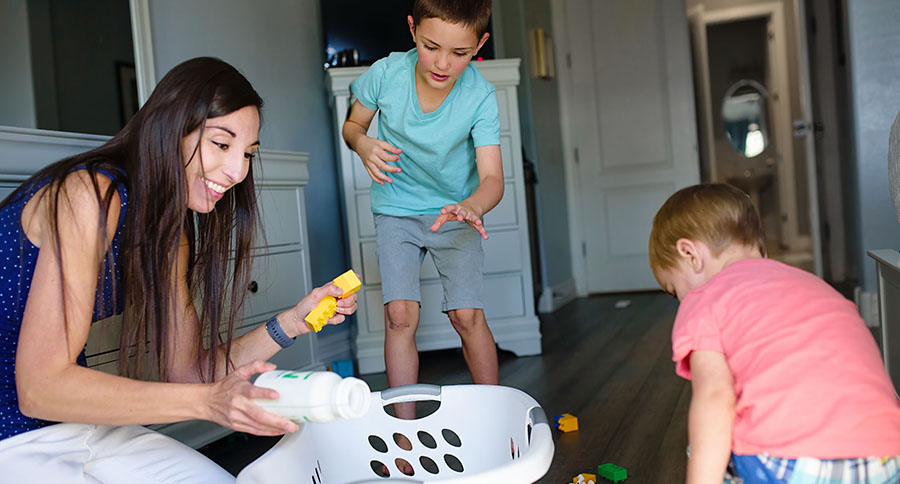
The Root Causes: Why We Over-function
As with any behavior, there’s typically a root cause or a reason why you’re behaving this way. As I mentioned, I found myself over-functioning for every person in my house and my nervous system was BURNING out.
If it were healthy for me, I wouldn’t have gotten to a “rock-bottom” place. With some deep work, I uncovered why this was happening.
Generational Patterns
Our parenting styles don’t develop in isolation – our own childhood experiences deeply influence them.
A parenting book that ROCKED my world is “Parenting from the Inside Out by Dr. Daniel Siegel. In that book, he explains that we often parent either in alignment with or in direct opposition to how we were parented. These deeply ingrained patterns can be difficult to recognize because they feel so natural to us.
Many parents who over-function today grew up in homes where they either received too much or too little support. Those who had over-functioning parents might simply be repeating what they know, while those who lacked support might be determined to give their children everything they didn’t have. The impact of our childhood experiences on our parenting style runs deep, often operating at a subconscious level.
Common generational patterns that lead to over-functioning include:
- Compensating for absent parents: Parents who grew up with physically or emotionally absent caregivers often swing to the opposite extreme, becoming overly present and involved. My dad was as present as he could be with a 9a – 9p job, but my mom was incredibly absent in my life and when she was around, her actions were incredibly harmful.
- Continuing family patterns: Some parents unconsciously replicate the over-functioning patterns they experienced, viewing this as normal parenting behavior.
- Healing past wounds: Parents might over-function as a way to protect their children from difficulties they experienced, essentially trying to heal their own childhood trauma through their parenting.
- Breaking generational patterns: Ironically, even parents actively trying to parent differently than their parents might over-function in their attempt to be “better” parents. I fit into this bucket as well.
Anxiety and Control
In our increasingly uncertain world, over-functioning often emerges as a coping skill for parental anxiety. Dr. Madeline Levine’s research reveals that parents today experience unprecedented levels of anxiety about their children’s futures. This anxiety can manifest as a need to control every aspect of their children’s lives, creating a false sense of security.
The relationship between anxiety and over-functioning is complex.
The more anxious we feel about our children’s success and well-being, the more we tend to take over. However, this control often increases our anxiety because we’ve made ourselves responsible for every outcome in our child’s life.
Common anxiety-driven behaviors include:
- Obsessive monitoring of grades, activities, and social interactions
- Difficulty letting children experience natural consequences
- Constant anticipation and prevention of potential problems
- Excessive worry about future implications of current situations
- Compulsive need to prevent any discomfort or failure
I have to be incredibly intentional when any of my kids are struggling. I’ve developed quite the self-talk to walk me through how to stay calm and present, not allowing the anxiety to take over and hijack my kids’ development. It’s taken many years, but I can finally just “be” with my kids when they are crying or yelling over something that they’re upset about. It’s amazing how doing this has increased their emotional regulation and helped them develop the skills they need to tackle hard things on their own.
Societal Pressure
Modern parenting exists in a pressure cooker of social expectations and comparisons.
Hello, social media!
The online world has created an environment where parents constantly see carefully curated versions of other moms’ lives. The rise of “intensive parenting” as the cultural norm has made over-functioning seem not just acceptable, but in a sense, expected.
Today’s parents face unprecedented pressure to raise “successful” children, with the definition of success becoming increasingly narrow and demanding. This pressure is compounded by the constant visibility of our parenting choices through online networks and parent communities.
Key societal factors contributing to over-functioning:
- Social media’s portrayal of perfect parenting
- Competitive parenting culture in many communities
- Fear of judgment from other parents
- Pressure to ensure children’s future success in an increasingly competitive world
- Cultural expectations of intensive parenting
- The myth of the perfect parent perpetuated by the media
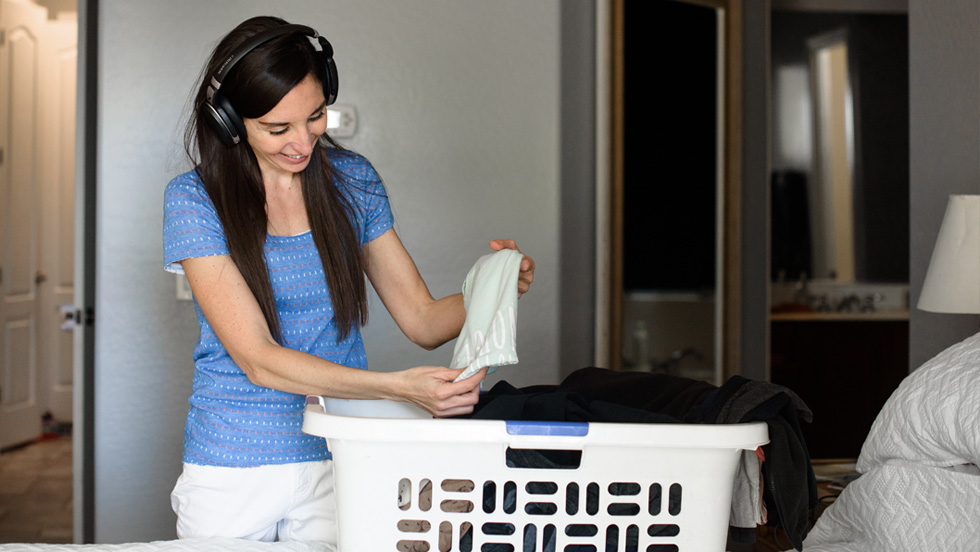
Personal Identity
The blurring of lines between parent and child identity has become increasingly common, especially for parents who’ve made significant career sacrifices for their families. When parents derive their primary sense of purpose and achievement from their children’s success, over-functioning becomes almost inevitable.
This fusion of identity can be particularly strong for parents who’ve stepped back from careers or other personal pursuits to focus on parenting. Without other sources of validation and achievement, parents might unconsciously use their children’s accomplishments to fulfill their own needs for success and recognition.
Signs that personal identity is driving over-functioning:
- Excessive emotional investment in children’s achievements
- Difficulty separating your own goals from your child’s
- Finding primary life satisfaction through your child’s successes
- Loss of personal hobbies or interests outside of parenting
- Struggle to maintain personal boundaries
- Resistance to child’s increasing independence
- Over-identification with the “parent” role at the expense of other life roles
Understanding these root causes is crucial for breaking the cycle of over-functioning. By recognizing our triggers and motivations, we can begin to make conscious choices about when to step in and when to step back, ultimately creating a healthier dynamic for both parent and child.
The Emotional Component: When Helping Hurts
Dr. Lisa Damour, author of “Untangled: Guiding Teenage Girls Through the Seven Transitions into Adulthood” explains that emotional over-functioning can be particularly damaging. When parents constantly rush to manage their children’s emotions, they prevent crucial emotional development:
- Children don’t learn to self-soothe
- They struggle to identify their own feelings
- They become dependent on others for emotional regulation
- They miss opportunities to develop resilience

Breaking the Cycle: Understanding Your Triggers
Breaking free from over-functioning patterns requires deep self-reflection and conscious effort to change ingrained behaviors. The journey begins with understanding what drives our actions as parents.
Let’s explore how to identify and address these underlying motivations.
Examine Your History
As we now know, our own childhood experiences deeply influence our parenting style. Take time to reflect on the messages you received about parenting while growing up. Were you expected to be completely independent, or did your parents handle everything for you? These early experiences shape our understanding of what “good parenting” looks like.
This is not an exercise where we poke at or get upset with our parents. I truly believe each generation is doing the best they can with the knowledge and wisdom they have. They didn’t have all the incredible resources (or even the brain research) that parents today have. I’m very thankful to have a parent who I can openly talk to my childhood about.
My dad is very well aware of my shortcomings and how I had to grow up way too fast. What I think is incredibly beautiful and healing is to watch him care for my nephews in completely different ways than when he raised us. He watches neuropsychologists on YouTube and is much more attuned to his grandchildren’s needs. We are both breaking generational patterns!!
Consider writing down specific memories about how responsibilities were managed in your childhood home. Did your parents trust you with age-appropriate tasks, or did they maintain tight control? Understanding these patterns can help you identify whether you’re reacting to or replicating your childhood experiences.
Fear often drives our need to control our children’s experiences. These fears might stem from our childhood struggles or current anxieties about our children’s futures. By identifying these fears, we can begin to separate legitimate concerns from anxiety-driven over-functioning.
Challenge Your Beliefs
Once you understand your history, it’s time to question whether your current beliefs about parenting truly serve your child’s best interests. When you feel the urge to step in and take over, pause and ask yourself what message you are sending when you do something for your child. Are you communicating trust in their abilities, or are you inadvertently telling them they’re incapable? Now that I have a teenager, he flat out tells me, when I’m doing this. He has a strong desire to have autonomy and agency and I’ve had to learn how to respect his boundaries as he grows.
Consider the natural learning opportunities you might be preventing. For instance, if your child forgets their lunch at home, allowing them to ask for food might be more valuable than rushing to school with their forgotten meal. These moments of discomfort often become powerful teaching opportunities.
Take time to envision the long-term benefits of stepping back. How might your child develop problem-solving skills, confidence, and resilience when given the chance to handle age-appropriate challenges?
Remember, our goal is to raise capable adults, not perpetually dependent children or kids who are “successful” by our culture’s definition.
Identify Your Patterns
Self-awareness is crucial in changing behavior.
Start paying attention to specific situations that trigger your over-functioning tendencies.
- Do you become more controlling when your child is struggling academically?
- Does your over-functioning increase when you’re stressed or tired?
- What time of day do you tend to over-function?
- Are you over-functioning for only one or all of your children?
Understanding these patterns helps you anticipate and manage your responses.
Keep a simple journal noting when you feel compelled to take over for your child. Pay attention to your feelings!
Often, our own anxiety, perfectionism, or need for control drives our over-functioning. By recognizing these emotional triggers, we can respond more thoughtfully rather than reactively.

Creating Healthy Boundaries
Dr. Henry Cloud, author of “Boundaries With Kids” emphasizes that establishing and maintaining boundaries is essential for both parent and child development. This process begins with clearly defining what responsibilities belong to the parent and what belongs to the child. These boundaries should evolve as your child grows and develops new capabilities.
Start by mapping out age-appropriate tasks your child can manage independently. This might include morning routines, homework management, or social responsibilities. Be specific about your expectations, but also be realistic. Remember that learning new skills takes time and practice.
When communicating these boundaries, focus on empowering your child rather than overwhelming them. Instead of saying, “You need to do this yourself now,” try, “I’ve noticed how capable you’ve become, and I think you’re ready to handle this on your own.” This approach builds confidence while maintaining connection.
Consistency is key to maintaining healthy boundaries. It’s natural to want to step in when you see your child struggling, but resist this urge unless safety is concerned. Each time your child works through a challenge independently, they build confidence and competence.
Create a support system for yourself during this transition. Share your goals with your partner or a trusted friend who can encourage you when you’re tempted to fall back into over-functioning patterns. Celebrate small victories – both your child’s growing independence and your ability to step back.
Remember that establishing boundaries is a process, not a one-time event. There will be setbacks and moments of doubt, but stay committed to the larger goal of raising a capable, confident child. Your role is to provide guidance and support while allowing your child to develop problem-solving skills and resilience.
The Impact on Family Dynamics
Over-functioning doesn’t just affect the individual engaging in it—it ripples through the entire family system, often in ways that aren’t immediately obvious.
- Creates Dependency in Children: When parents over-function, they often step in to handle tasks or decisions their children are capable of managing themselves. This can unintentionally stunt children’s growth, leaving them less confident in their abilities and more reliant on their parents to solve problems, navigate challenges, or handle responsibilities. Over time, this fosters dependency and hinders the development of essential life skills.
- Strains Parent-Child Relationships: Over-functioning can cause friction between parents and children. While parents may feel they’re being helpful or protective, children may interpret these actions as a lack of trust in their abilities. This can lead to frustration, rebellion, or a reluctance to engage in open communication.
- Leads to Parental Burnout: Taking on too much for the sake of others often results in exhaustion and emotional depletion. Parents who over-function may feel overwhelmed by the weight of their responsibilities, leaving little time or energy to care for themselves. This burnout not only impacts their mental and physical health but also diminishes their ability to connect meaningfully with their family.
- Can Cause Resentment Between Parents: In households where one parent over-functions more than the other, an imbalance in responsibilities can develop. This often leads to resentment, as the over-functioning parent feels unsupported while the other parent may feel excluded or criticized for not “doing enough.” Or the other parent could develop jealousy for not getting as much attention as the kids. This tension can strain the partnership and disrupt the family’s overall harmony.
Addressing over-functioning is essential for restoring balance in family dynamics. By recognizing and adjusting these patterns, families can foster healthier relationships, encourage independence, and create an environment where everyone thrives.
Moving Forward: The Path to Healthy Functioning
The journey from over-functioning to healthy support isn’t a straight path, but rather a continuous process of growth and adjustment.
Celebrate progress together – both yours and your children’s
Notice and acknowledge the small victories: the first time your child remembers their lunch without prompting, successfully resolves a friendship conflict on their own, or completes a project without your intervention. Or in my case, when my child acknowledges his feelings and starts taking deep breaths without my prompting is something to celebrate!
These moments of success build confidence and momentum for both parent and child.
Remember that moving away from over-functioning isn’t about becoming an uninvolved parent. Rather, it’s about finding the sweet spot between support and independence. Your goal is to be present and available while allowing your child the space to develop their capabilities and confidence.
Drop your questions about over-functioning in the comments below!


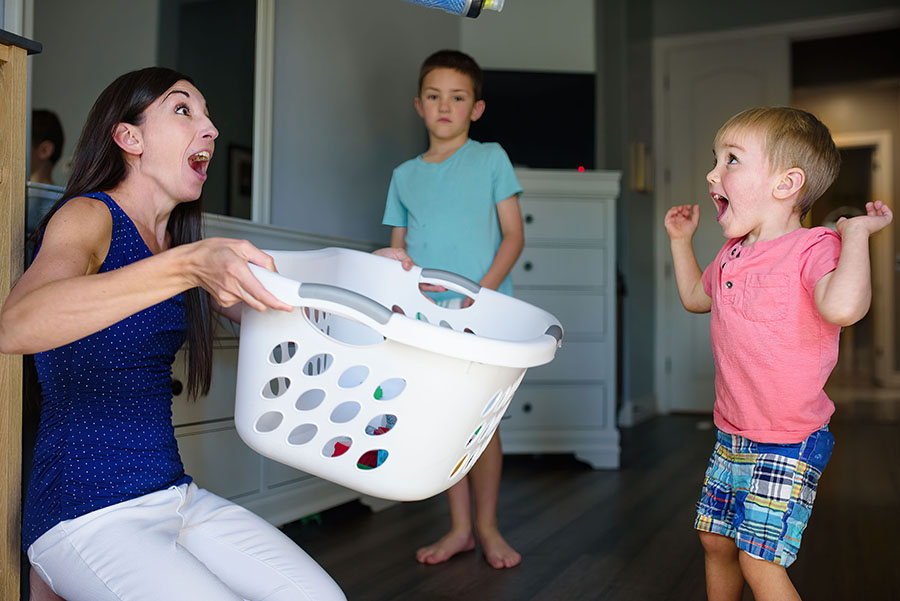

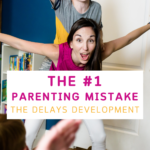


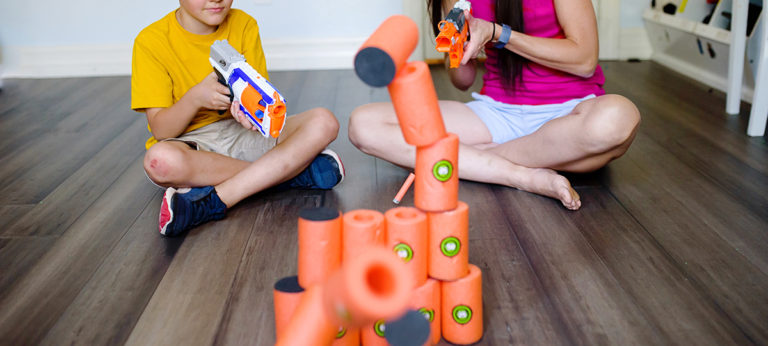


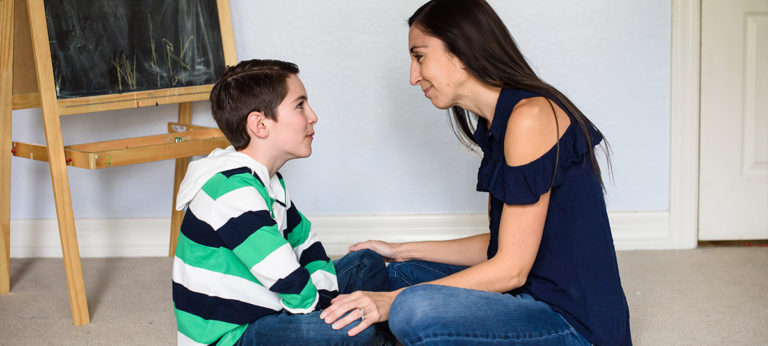
Really interesting, I’m definitely guilty of this to an extent, and I’m looking to trying out your techniques. Thanks for always providing us with excellent guidance!